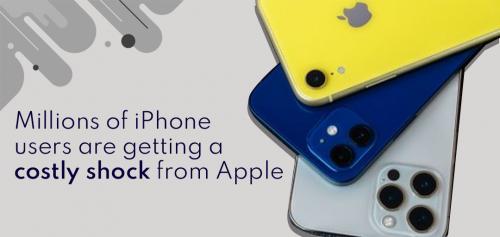Millions of iPhone users are getting a costly shock from Apple

It’s no secret that Apple products are a bit on the expensive side. The latest addition in the iPhone lineup has finally been released and users are just waiting to get their hands on the much-anticipated iPhone 13. While the iPhone 13 is quite a pricey device, users may be in for quite an expensive shock.
Costly Shock from Apple
Every iPhone 13 model, according to an eye-opening analysis from iFixit, contains a "new screen repair trap that might revolutionize the repair industry forever." And falling into that trap will cost you both time and money.
When iFixit dismantled iPhone 13 units, they discovered that Apple had inserted a little chip into the bottom of the screens. It's a microcontroller chip that connects each iPhone 13 to its display. The microcontroller must be prompted to couple with the replacement screen when a display is damaged and needs to be replaced. This necessitates the use of the 'Apple Services Toolkit 2' (AST2), an expensive proprietary service that requires Apple's permission and certification.
In the case that the new screen isn't paired with the iPhone 13's microcontroller, Face ID, the iPhone's primary form of security, has been deactivated, with the statement "Unable to activate Face ID on this iPhone." Even if the repairer is using a genuine Apple display, this happens, and it's completely unnecessary.
Even if you only get your iPhones repaired by Apple, iPhone 13 owners should be concerned about this. First, the shift reduces choice, so individuals who do not live near an Apple shop will have fewer options. Second, because there is no competition, Apple can set whatever prices it wants. Apple already charges $600 for an iPhone 11 Pro Max's out-of-warranty glass replacement, thereby compelling consumers to purchase AppleCare+ insurance.
Wrapping Up
This is not the first time Apple has limited options for users, third-party repair issues for Touch ID, iPhone batteries, and cameras have been caused by Apple. The company’s products are already quite selective for example it is extremely difficult to share SMS from an iPhone to Android. Each time the tech giant pulls a stunt like this, the public reacted negatively, and Apple walked them all back, claiming that it was a bug. It's feasible that Apple will make the same claim and repair it if there's enough public backlash.
Post Your Ad Here
Comments